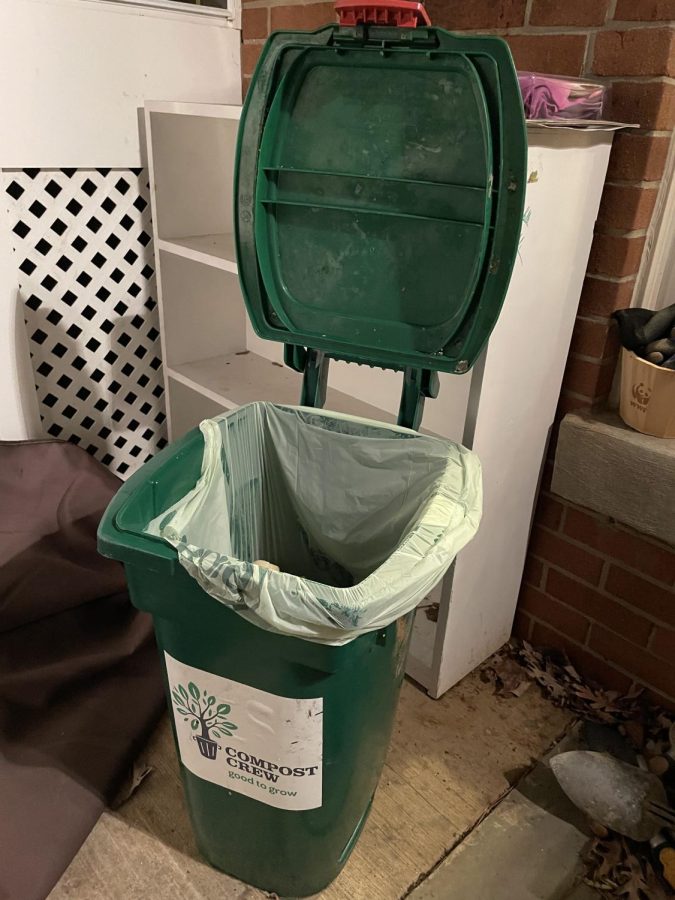Composting efforts should be used to improve MCPS’s footprint
While many students’ families compost at home, both the environment and economy would benefit from school wide composting.
March 11, 2023
Every year, approximately 268 million tons of waste are produced in the United States alone. According to the U.S. Environmental Protection Agency (EPA), this means every American produces roughly 4.4 pounds of waste every day and yet 28% of waste deposited in landfills can be composted. The country and world’s poor waste management contributes to climate change and air pollution and has a negative impact on human health. Luckily, there are viable solutions to improve waste management that are cost effective and healthy, but it is vital that they are implemented in all aspects of life, particularly in school.
Just like the saying “what goes up must come down”, anything that grows must eventually decompose, and composting simply speeds up this process. According to the Natural Resources Defense Council, composting is the natural process of recycling organic matter which takes place in a provided ideal environment for bacteria, fungi and other decomposing organisms to do their work. Compost, the result of this process, often looks like fertile garden soil, is rich in nutrients and can be used for gardening and agriculture. Compost promotes healthier plant growth by balancing soil density, adding and retaining nutrients and discouraging diseases, pests and weeds.
Composting has a plethora of environmental benefits from stimulating plant growth to reducing land and water pollution. Composting, by virtue of its definition, reduces the amount of waste that ends up in landfills. When tossed into landfills, food and yard waste are without the proper environment to decompose so they rot and release carbon dioxide and methane into the air. These powerful gasses contribute to climate change and the human enhanced greenhouse effect.
Compost improves the structure of soil and because it helps aerate and fertilize the soil and reduces the amount of fertilizer needed by farmers. Additionally, compost can hold five to 20 times its weight in water, meaning that water penetration into soil is increased when compost and soil are mixed. This also allows water to seep down to the rock layer where it replenishes water sources such as springs, ponds and lakes. By the time the water makes its way down to the water sources, it has already passed through compost, soil and rock layers, which act as a natural filter. This process in turn leads to cleaner rivers, lakes and oceans when the water inevitably flows into them. While these are only a handful of the benefits to composting, one could say that it is a “soil-ution” to many of the world’s environmental problems.
Not only is composting good for the environment, it is also extremely beneficial to the economy. Using compost allows farmers and gardeners to do without buying pesticides and fertilizers, both of which can be quite costly. As with most green industries, composting creates many jobs. It has been shown that composting plants create more jobs than other disposal facilities such as landfills, leading to the creation of thousands of new and necessary jobs when composting becomes the go-to disposal process in the country.
According to the World Wildlife Fund, U.S. schools produce approximately 530,000 tons of waste annually. While this accounts for less than one percent of the total waste produced in the U.S. annually, it is an enormous amount. By introducing composting into schools, these numbers can be significantly reduced, since much of the school-produced waste comes from half eaten lunches, snacks and paper. In addition, many school supplies are compostable and schools would in turn be able to use the compost they have created for their own grounds and gardens and save money that can be used for other important things.
Schools should put composting bins in their cafeterias for leftover food from students’ lunches. Many municipalities, such as Montgomery county, provide composting services and pickup bins at no additional cost which could be utilized by the schools. Additionally, announcements should be made so that students are aware of the initiative and lessons on composting could be provided during instructional hours so that students understand what can be composted.
There is one way to ensure that composting becomes the way of the future: Teach the younger generations. By implementing composting programs in schools, students will learn about the process of composting, as well as its environmental and economic benefits. Students will then be more likely to participate in composting when they are older as it becomes more widely available. Composting has an unlimited number of benefits and it has become increasingly clear that it will play a big role in the fight against climate change and environmental pollution, so why not build from the ground up?



